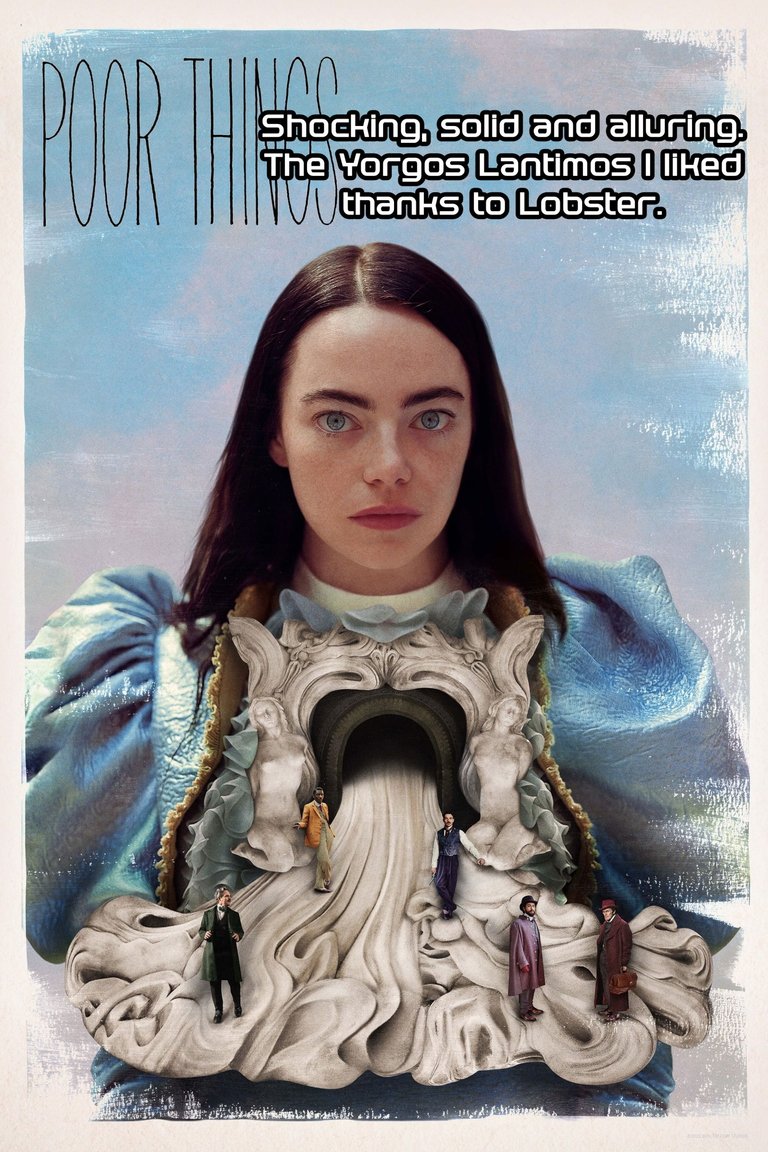
Recently, my girlfriend and I have watched quite a lot of series and films about women and for women. Some of them will receive their own text (e.g. Hazbin Hotel, Lioness), and I have already published an opinion about Woman and the Sea. Today I will share with you my opinion about Poor Things. A film by a controversial, characteristic, characterful, solid and talented Greek creator. Yorgos Lantimos is one of the most interesting directors I have ever encountered. Although I'm not a fan of it, because I've only seen Lobster (which I don't like by the way), but once in a while it wouldn't hurt to watch something more ambitious and artistic. One that forces you to think, raises difficult topics that concern each (most) of us, asks difficult questions (or rather, provokes us to give painful answers?), and is characterized by (or inspiring, or both at the same time, if you prefer) artistry. Sometimes vulgarly, usually directly or brusquely, but always in an elegant form. It can be repulsive, but it's not at the level of vulgar street comedians who focus on simple entertainment. Coming back to artistic cinema, I wouldn't be able to sustain it in the case of a series (or any other, longer form), or at least I can't do it for now. It's different for a single movie. Here it is easier to grit your teeth and force yourself to pay attention for even 2.5 hours.
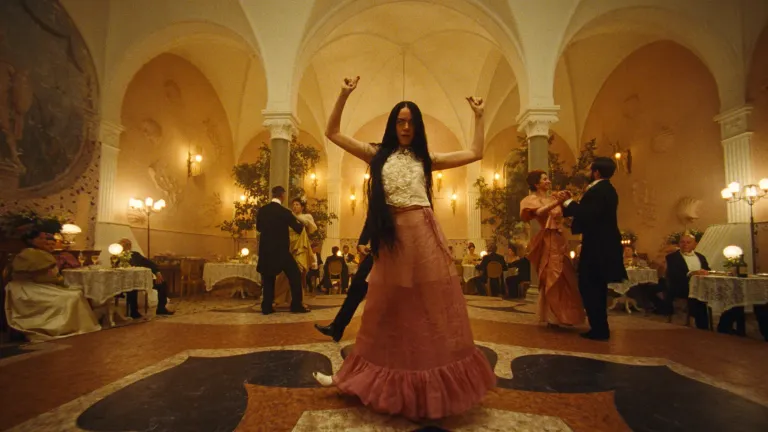
The review is spoiler-free, but I must reveal one thing. This will be the only spoiler you will encounter in this text. Anyway, the movie tells us this pretty quickly, so I don't think it's a big problem. One of the first scenes is a woman's suicide. As it turns out, she is the protagonist of the film (if you haven't seen the trailers, he he), who was brought back to life thanks to Dr. Godwin Baxter. We found out that the woman was pregnant, so Willem Dafoe came up with the idea of swapping their brains. An unborn baby (I assume he was 6 or 7 months old at most) and an adult woman, probably about 30 years old. This may seem like a simple task to some, thinking that babies and children respond in a relatively self-controlled way like adults. I don't want to come off as someone saying obvious things as if they were secret knowledge. The point is that we often don't think about it on a daily basis. We have simply forgotten, more or less, how we behaved ourselves long ago. Children are more direct in words, actions and reactions, something like disturbed people. But as small, sweet creatures, they don't have the strength to harm anyone. They also cannot speak, and children sometimes repeat certain rude words after their elders when they do something they don't like or meet someone they don't like. I don't know how often or if in every case, but an active parent will also notice by his facial expression that something is wrong with his child, before he signals it with a loud roar (translating into human language in a slightly vulgar, joking way: "Mother, where the fuck is dinner?!" , "Dad, read me bedtime stories, because your tone of voice calms me down.") This is where the stairs begin, and for such a role to be good and convincing, it must be performed by a good actor or actress and director.
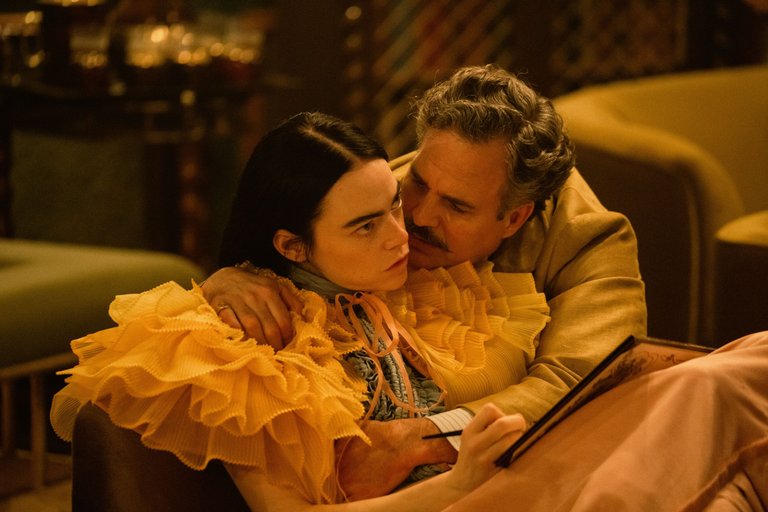
And in this case that is exactly the case. I won't lie, I liked Lily Gladstone more in Killers of the Flower Moon, but that's only because I prefer "normal" cinema that doesn't involve me in that way. I'm avoiding judgment here because both films are great, as are the directors. Ok, Yorgos is worse, if I have to compare (something like an old, very experienced and talented fighter vs. a young and talented fighter, looking through the prism of skills), but Martin Scorsese is unfortunately closer to the end of his career, and he has already done his job. The Greek, however, has the potential to be the next great director who will add his contribution to world cinematography and culture.) Coming back to the actresses, because this is their paragraph, they both played amazingly well. Probably more than one film lover noticed that at the last Oscars (and other film competitions), there was fierce competition between them. It's hard for me to say which one was better. It's as if I had to choose between a meal from the Master Chef of the best restaurant in a big city and a signature dish from my Grandma, who has many years of experience in hosting large weddings and events where food is an important part. A matter of preference.
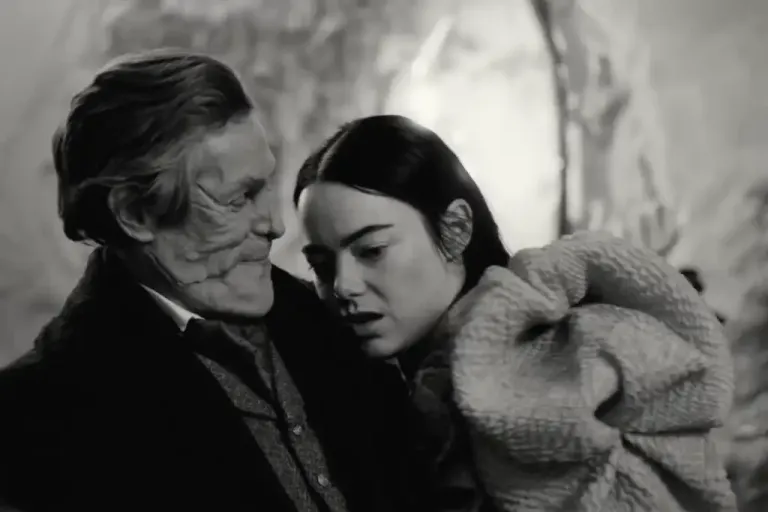
Emma Stone could be annoying, but that was the director's goal and vision for both of them. I say both because the actress had a lot of input into the shape and development of her character. If the information I've heard isn't false, Emma Stone had full authority when it came to the bed scenes. She decided what to show viewers and for how long. By the way, both of them are very pleased with the cooperation (like the rest of the crew, Dafoe and Mark Ruffalo praised their cooperation with the Greek). Yes, the scenes are strong, but if you want to see something more "tightening up" the atmosphere and lighter (but also not easy!), I recommend Blue Is The Warmest Color. The scenes in Poor Things can be treated this way, but they serve a different purpose. Contrary to appearances (I heard different opinions on the Internet, my girlfriend had the same opinion), these are not pornographic scenes. Erotica can sometimes be harsh, and porn can be presented in a more delicate form, such as films by X-Art studios, Bellesa, Hegre. Or those directed by women. Generally speaking, "intimate porn" is quite a large part of the market. The scenes in Poor Things are a bit more erotic. We mainly see the heroine's breasts, we see the male or female crotch a maximum of 5 times in total (maybe 7 or 8 if I looked away for a moment at the wrong moment). As far as I know, she played all the scenes herself, without a stunt double. If that was the case, I respect your courage.
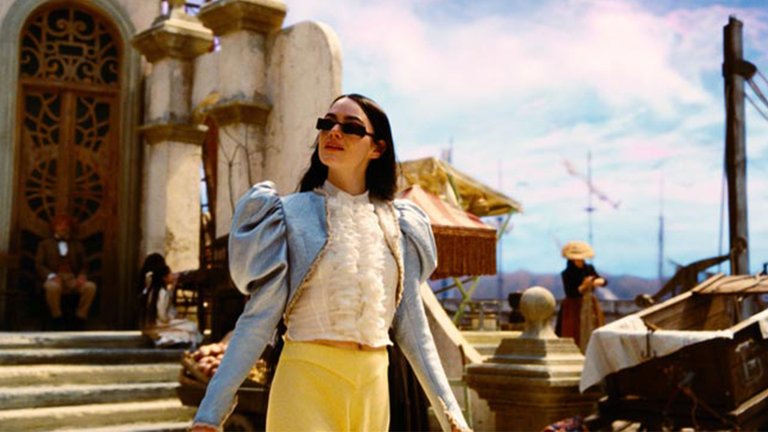
Returning to more spiritual experiences, Emma Stone brilliantly showed the transformation scene. The director additionally emphasized this by changing the colors, atmosphere, and fewer and fewer abstract elements. She showed a wide range of skills in facial expressions and voice acting. You can also see it in the way it moves, depending on the stage it is in. A very consistent and well-thought-out production and role. Emma Stone does all the things I don't even dare spoil to you with genuine conviction. As if they were completely natural to her. Just like they might behave as adults if we didn't reject these behaviors at a certain stage of development. It doesn't matter whether she is sad, happy, experiences orgasm, embarrassment, wants someone else's sadness (Germans call it Schadenfreude), is afraid, is curious, allows herself to be taken advantage of - she does all this with great sincerity and conviction. If someone says it's easy, I'll say this - kicking a rag ball is also easy, so let's go to the fields and each of us will be like Lewandowski, ok?
Will Dafoe, Mark Ruffalo and Ramy Youseef also showed good acting. I don't like actors 2 and 3, my attitude towards them is similar to how I judge the director, but as you probably know (if you know my previous reviews), I like to put my emotions aside when judging. The actor playing the Hulk introduced us to a character that differs significantly from the image he created in the Marvel universe. In Poor Things, he played the role of a pickup artist who wants to have fun with young women all the time, changing them when they start to get bored. He is not a bad boy, and if he is, he is presented in a somewhat bizarre and comedic way. He's closer to a joker, like Jaskier from The Witcher. Such a soft dumpling who can't contain her sexual desire. Dafoe played the role of the creator of the protagonist, and his character serves as a figure of God and father at the same time. The role is not too complicated and extensive. Just an ordinary mad scientist. who wants to have a child, but above all suffers from a God complex. I don't know if I've seen this specific creation somewhere, but there are some that I recognize from other works of culture (a crazy/wronged/misunderstood and rejected scientist with divine ambitions) and they fit it like a glove. I've seen them too many times. However, this is not a problem because the director does not pay much attention to it. I don't know Mr. Youssef, but from what I see it's a matter of my ignorance, not low recognition. He played the role of a sensitive and calm man really well. It's hard for me to say anything more about it without going into spoilers. His role gains depth and significance by the end of the story. The message behind it is important, just like several others that the director (and the author of the book, because it is an adaptation of a 1992 book by a Scotsman named Alasdair Gray) put in this film.
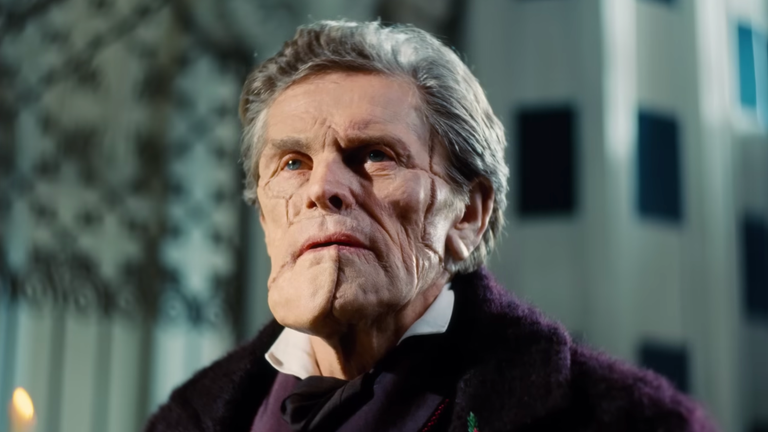
To the visual sphere, Yorgos' artistry, references to old cinematography (?), etc. I won't comment. I don't like this aspect and I don't like (although I appreciate and respect the quality! I'll happily watch it once every few years.) the director's style, so I'll just move on to the summary. I won't rate it because I don't know how to rate it. It's simply worth seeing. This is an extraordinary production from a director who escapes numerous patterns and ways of thinking. There are few creators (and if you take away comedies like South Park, Hazbin Hotel, the first three seasons of Rick and Morty, there are even fewer of them) who can show that right-wing and left-wing values make sense and can be combined, at least in some version that is convenient for us. As I wrote in the introduction, Yorgos loves to ask difficult questions that require difficult, sometimes even painful answers. So far, I haven't seen any director who showed something that I heard as a child and have been repeating for several years - our perception transmits reality through several layers. E.g. what we want/what we must do, what are our duties towards society/what are our duties towards ourselves, what kind of person do we want to be/what kind of person do we have to be, e.g. due to our character defects or how to combine the desire to escape from society with some interactions so as not to lose contact with reality. I have oversimplified it, but expanding this thread could involve expanding the entire text, and it was just an example. Ultimately, it is not Lobster, which was like a hurricane in my brain and turned it into a brothel to match. It's a little lighter, which only worked better for him. This will make us ask ourselves more questions about ourselves.
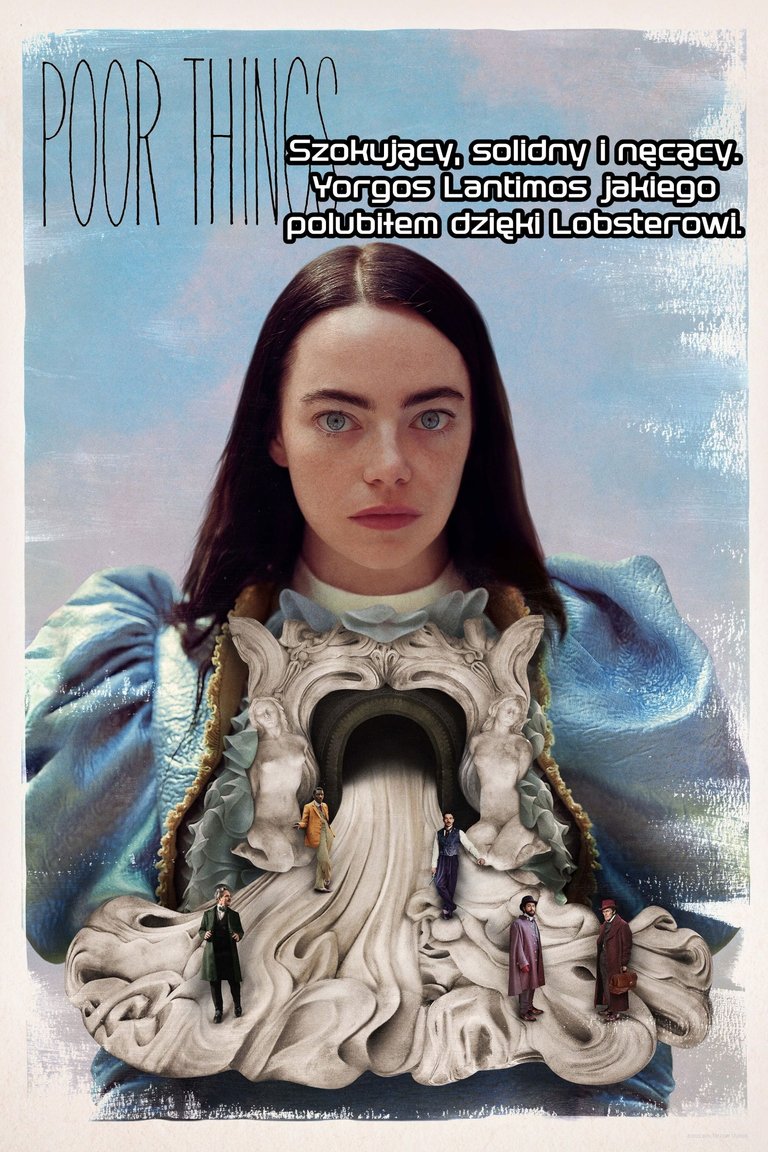
Ostatnio wraz z moją dziewczyną, zobaczyliśmy dość dużo seriali i filmów o kobietach i dla kobiet. Część z nich dostanie swój osobny tekst (jak np. Hazbin Hotel, Lioness), a opinię o Woman and the Sea już opublikowałem. Dzisiaj podzielę się z Wami moją opinią na temat Poor Things. Film kontrowersyjnego, charakterystycznego, charakternego, solidnego i utalentowanego Greckiego twórcy. Yorgos Lantimos, jest jednym z ciekawszych reżyserów, z jakimi się dotychczas zetknąłem. Co prawda nie jestem jego fanem, bo widziałem jedynie Lobstera (którego swoją drogą nie lubię), ale raz na jakiś czas nie zaszkodzi obejrzeć coś ambitniejszego i bardziej artystycznego. Takiego zmuszającego do myślenia, poruszającego trudne tematy dotyczące każdego (większość) z nas, stawiający trudne pytania (czy może raczej, prowokującego do udzielenia bolesnych odpowiedzi?), czy charakteryzującego się (lub inspirującego, albo oba jednocześnie, wedle woli) artyzmem. Czasem wulgarnie, zwykle bezpośrednio czy obcesowo, ale zawsze w eleganckiej formie. Bywa to odrzucające, ale nie jest to poziom wulgarnych, ulicznych komediantów stawiających na prostą rozrywkę. Wracając do artystycznego kina, nie byłbym w stanie tego wytrzymać w przypadku serialu (lub innej, dłuższej formy), a przynajmniej póki co nie idzie mi to. Co innego w przypadku pojedynczego filmu. Tutaj łatwiej zacisnąć zęby i zmusić się do uwagi przez te nawet 2.5 godziny.

Recenzja jest bezspoilerowa, ale muszę zdradzić jeden wątek. Będzie to jedyny spoiler, na jaki traficie w tym tekście. Zresztą, film dość szybko nam to zdradza, więc nie uważam tego za duży problem. Jedną z pierwszych scen, jest samobójstwo kobiety. Jak się potem okazuje, jest to protagonistka filmu (o ile nie widzieliście trailerów, he he), która została przywrócona do życia dzięki doktorowi Godwinowi Baxterowi. Dowiedzieliśmy się, że kobieta jest w ciąży, więc Willem Dafoe wpadł na pomysł, by zamienić ich mózgi miejscami. Jeszcze nie narodzonego niemowlaka (zakładam że mogło mieć max 6, 7 miesięcy) i dorosłej kobiety, na oko mającej około 30 lat. Niektórym może się to wydawać prostym zadaniem, myśląc że niemowlaki i dzieci reagują w sposób w miarę kontrolując się, jak dorośli. Nie chcę wyjść na kogoś mówiącego oczywiste rzeczy, tak jakby były tajemną wiedzą. Chodzi o to, że często nie myślimy o tym na codzień. Po prostu zapomnieliśmy, mniej lub bardziej, jak sami się zachowywaliśmy dawno temu. Dzieci są bardziej bezpośrednie w słowach, czynach i reakcjach, coś jak ludzie zaburzeni. Tylko że jako małe, słodkie istoty nie mają tyle siły, by wyrządzić komuś krzywdę. Nie umieją też mówić, a zdarza się że dzieci powtarzają za starszymi pewne niegrzeczne słowa, gdy robią coś, czego nie lubią lub spotkają kogoś kogo nie lubią. Nie wiem jak często i czy w każdym przypadku, ale aktywny rodzic zauważy też po mimice, że dziecku coś nie pasuje, zanim zasygnalizuje to głośnym rykiem (tłumacząc na ludzki w nieco wulgarny, żartobliwy sposób: "Matka, gdzie jest kurwa obiad?!", "Tato, poczytaj mi bajki na dobranoc, bo twój ton głosu mnie uspokaja".) Tu zaczynają się schody i żeby taka rola wypadła odpowiednio dobrze i przekonywująco, musi się za nią zabrać dobry aktor lub aktorka i reżyser lub reżyserka.

I w tym przypadku właśnie tak jest. Nie będę oszukiwał, bardziej przypadła mi do gustu Lily Gladstone w Killers of the Flower Moon, ale to wynika tylko z tego, że wolę "normalne" kino, które nie angażuje mnie w taki sposób. Unikam tutaj oceniania, bo oba filmy są świetne, tak samo jak reżyserzy. No ok, Yorgos jest gorszy, jeśli już mam porównywać (coś jak stary, bardzo doświadczony i utalentowany wojownik vs. młody i zdolny, patrząc przez pryzmat umiejętności), ale Martin Scorsese jest niestety bliższy końca kariery, no i swoje już zrobił. Grek natomiast ma potencjał na bycie kolejnym wielkim reżyserem, który doda swój wkład do światowej kinematografii i kultury.) Wracając do aktorek, bo to ich akapit, obie zagrały zniewalająco dobrze. Zapewne nie jeden miłośników filmów, zauważył że na ostatnich Oscarach (oraz przy okazji innych konkursów filmowych), była między nimi zacięta rywalizacja. Trudno mi ocenić, która była lepsza. To tak jakbym miał wybierać między posiłkiem Mistrza Kuchni najlepszej restauracji w dużym mieście, a popisowym daniem Babci, która ma wieloletnie doświadczenie w prowadzeniu dużych wesel i imprez, których istotną częścią jest jedzenie. Kwestia preferencji.

Emma Stone bywała irytująca, ale taki był cel reżysera i wizja ich obojga. Mówię obojga, bo aktorka miała duży wkład w kształt i rozwój swojej postaci. Jeśli informacje, o których słyszałem nie są fałszywe, to Emma Stone miała pełną władzę w kwestii scen łóżkowych. To ona decydowała co i jak długo pokaże widzom. Swoją drogą, oboje są bardzo zadowoleni ze współpracy (jak i reszta załogi, Dafoe i Mark Ruffalo chwalili sobie współpracę z Grekiem). Tak, sceny są mocne, ale jeśli chcecie zobaczyć coś bardziej "podkręcającego" atmosferę i lżejszego (ale również nie łatwego!) to polecam Blue Is The Warmest Colour. Sceny w Poor Things co prawda można tak traktować, ale służą czemuś innemu. Wbrew pozorom (słyszałem w internecie różne opinie, moja dziewczyna również taką miała), to nie są sceny pornograficzne. Erotyka potrafi być czasem ostra, a porno można przedstawić w delikatniejszej formie, jak np. filmy studiów X-Art, Bellesa, Hegre. Albo te reżyserowana przez kobiety. Generalnie taki "intymne porno", to dość duża część rynku. Sceny w Poor Things, to są takie trochę mocniejsze erotyki. Widzimy głównie piersi bohaterki, męskie lub żeńskie krocze widzimy łącznie max 5 razy (może 7,8 jeśli na chwilę odwróciłem wzrok w złym momencie). Z tego co wiem, wszystkie sceny odegrała osobiście, bez dublerki. Jeśli tak było, szanuję za odwagę.

Wracając do bardziej duchowych doznań, Emma Stone świetnie pokazała scenę przemiany. Reżyser to dodatkowo podkreślił zmianą kolorystyki, klimatu, czy coraz mniejszą ilością abstrakcyjnych elementów. Pokazała szeroki wachlarz umiejętności w mimice, czy grze głosem. Widać to też po tym, jak się rusza, w zależności od etapu, w którym się znajduje. Bardzo konsekwentna i przemyślana produkcja oraz rola. Emma Stone wykonuje wszystkie rzeczy, o których nawet nie śmiem Wam spoilerować, z autentycznym przekonaniem. Tak jakby były dla niej totalnie naturalne. Tak jak mogliby się zachowywać jako dorośli, gdybyśmy nie odrzucali tych zachowań na pewnym etapie rozwoju. Nie ważne, czy się smuci, raduje, przeżywa orgazm, żenadę, chce czyjegoś smutku (Niemcy nazywają to Schadenfreude), boi się, jest ciekawa, daje się wykorzystać - wszystko to robi niezwykle szczerze i z przekonaniem. Jeśli ktoś powie, że to proste, to ja powiem tak - kopanie szmacianej piłki też jest proste, zatem chodźmy na boiska i każdy z nas będzie jak Lewandowski, ok?
Will Dafoe, Mark Ruffalo i Ramy Youseef również zaprezentowali dobre aktorstwo. Nie przepadam za 2 i 3 aktorem, mój stosunek do nich jest zbliżony do tego, jak oceniam reżysera, ale jak pewnie wiecie (o ile znacie moje wcześniejsze recenzje), lubię odstawiać swoje emocje na bok przy ocenianiu. Aktor wcielający się w Hulka, przedstawił nam postać, która znacząco odbiega od wizerunku, jaki wykreował w uniwersum Marvela. W Poor Things wcielił się w rolę podrywacza, który chce się cały czas zabawiać z młodymi kobietami, zmieniając je gdy zaczną mu się nudzić. Nie jest to badboy, a jeśli już, to przedstawiony trochę w kuriozalny i komediowy sposób. Bliżej mu do bawidamka, jak Jaskier z Wiedźmina. Taka miękka klucha, która nie umie powstrzymać swojej seksualnej chuci. Dafoe wcielił się w rolę stwórcy protagonistki, a jego postać pełni figurę Boga i ojca jednocześnie. Rola nie jest zbyt skomplikowana i rozbudowana. Ot zwykły, szalony naukowiec. który chce mieć dziecko, ale przede wszystkim cierpi na kompleks Boga. Nie wiem, czy gdzieś widziałem konkretnie taką kreację, ale są które kojarzę z innych dzieł kultury (zwariowany / skrzywdzony / niezrozumiały i odtrącony naukowiec z Boskimi ambicjami) i pasują do tego jak ulał. Widziałem je zbyt wiele razy. Nie stanowi to jednak problemu z uwagi na to, że reżyser nie poświęca mu zbyt wiele uwagi. Nie znam Pana Youssefa, ale z tego co widzę to kwestia mojej niewiedzy, a nie niskiej rozpoznawalności. Wcielił się naprawdę dobrze w rolę czułego i spokojnego mężczyzny. Trudno mi o nim powiedzieć coś więcej nie wchodząc w spoilery. Jego rola nabiera głębi i znaczenia pod koniec tej historii. Przesłanie jakie za tym idzie jest ważne, tak jak kilka pozostałych, jakie zamieścił w tym filmie reżyser (oraz autor książki, bo to adaptacja książki z 1992 autorstwa Szkota o imieniu Alasdair Gray).

Do sfery wizualnej, artyzmu Yorgosa, odwołań do dawnej kinematografii (?) etc. nie będę się odnosił. Nie lubię tego aspektu i nie lubię (choć doceniam i szanuję za jakość! "Chętnie" obejrzę raz na parę lat.) stylu tego reżysera, więc po prostu przejdę do podsumowania. Oceny nie dam, bo nie wiem jak go ocenić. Po prostu warto go zobaczyć. To nietuzinkowa produkcja od reżysera, który umyka licznym schematom i sposobom myślenia. Niewielu jest twórców (a jak się odejmie od tego komedie a'la South Park, Hazbin Hotel, pierwsze 3 sezony Rick and Morty, to jest ich jeszcze mniej), którzy umieją pokazać, że prawicowe i lewicowe wartości mają sens i można je połączyć, przynajmniej w jakieś dogodnej dla nas wersji. Tak jak napisałem we wstępie, Yorgos uwielbia zadawać trudne pytania, które wymagają udzielenia trudnej, czasem bolesnej wręcz odpowiedzi. Dotychczas nie widziałem jeszcze żadnego reżysera, który pokazał coś, o czym usłyszałem jako dziecko i od paru lat powielam - nasza percepcja przepuszcza rzeczywistość przez kilka warstw. Np. co chcemy / co musimy zrobić, jakie są nasze obowiązki wobec społeczeństwa / jakie są obowiązki wobec samego siebie, jakim chcemy być człowiekiem / jakim musimy być człowiekiem, np. z uwagi na nasze wady charakteru albo jak połączyć chęć ucieczki ze społeczeństwa z jakimiś interakcjami, by nie stracić kontaktu z rzeczywistością. Nadmiernie to uprościłem, ale rozwinięcie tego wątku mogłoby się wiązać z rozbudową całego tekstu, a chodziło tylko o przykład. Ostatecznie nie jest to Lobster, który był niczym huragan w moim mózgu i zrobił mi w nim adekwatny do niego burdel. Jest trochę lżej, co tylko podziałało na niego lepiej. Dzięki temu zadamy sobie więcej pytań na temat nas samych.

Poszliśmy na ten film i ponad 2 godziny byliśmy przerażeni na co poszliśmy. Chcieliśmy odpocząć po pracy na czymś ładnym. A tu sekcja zwłok z ładnymi widoczkami. Ehe, nie wyszło. No, ale to nasz błąd a nie reżysera
No ja na całe szczęście, zanim obejrzałem Lobstera, dostałem kilka ostrzeżeń co do tematyk, które porusza. Seksu jest tam mniej, jest też podany w mniej dosłownej formie, ale jest większą łamigłówką dla głowy. Dlatego od dziecka zwykle słucham recenzji zanim pójdę na film.
I recently watched this movie expecting something different than what I found in its first few minutes. Many compared it to "Alice in Wonderland" while others criticized it for its explicit scenes. When I watched it to review it, I was met with an absurd mix of dark humor, endless nude scenes, and awkward, even strange moments.
However, the way it is produced with a photography style and a way of directing the characters with a more or less agreed-upon story (removing all the above) impressed me, at least a little. I consider it a somewhat risky work due to the different themes it mentions and the references it makes to today's society, but it's not bad. Sure, I won't see her again, but oh well.
Good review.
Thank you for your kind words :).
It was similar for me. I also got something different from most of the reviews I heard (in my case there were 2 reviewers who more or less reflected my impressions after the screening, at least in the most important aspects).
I agree that the artistic style makes this commentary on modern society easier to swallow. As for me, I'll probably watch this movie a second time in a few years.
Emma Stone is wild and the best thing about her is that she loves exploring on screen how far she can go with being wild while keeping it tasteful and creative. I also watched the Kinds of Kindness, which had been directed by the same director and has got Stone and Dafoe as well as Jesse Plemons as the lead cast. I highly recommend watching it after Poor Things, all in order to appreciate the scope of Emma Stone's explorations.
It's true that it didn't catch my eye that much, but I won't deny that I didn't notice it. However, if I hadn't read about it earlier, I might have missed it :D. Thank you for the recommendation. My girlfriend liked Poor Things, so it will be easier to convince her to watch his latest production.